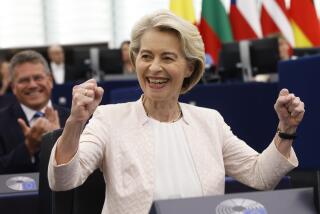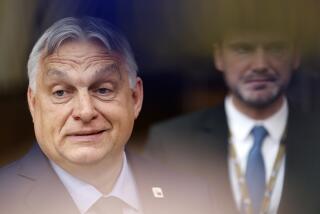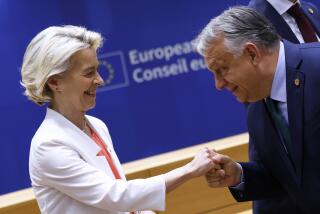Schroeder Has His Hands Full in the New Year
- Share via
BERLIN — After a scant two months as German chancellor, Gerhard Schroeder might be said to have the weight of the world on his shoulders.
With the chimes of the New Year, a quirk of fate in the rotation of international duties has saddled Germany simultaneously with the presidency of the European Union, as that body launches the euro common currency, and with the chairmanship of the Group of 7 industrialized nations, as it struggles to tame restless global markets.
The EU presidency changes hands every six months, and the G-7 is often criticized as little more than a rich men’s talking shop. But the coinciding pressures of the sensitive euro launch and the instability of economies from Latin America to Asia have all eyes trained on the neophyte chancellor as he takes on responsibility for so much of the world’s welfare.
As if the stakes weren’t high enough, Schroeder has vowed to use his term in the EU president’s chair to get his country’s oversized share of the alliance budget lowered. Germany contributes at least $12 billion more to EU coffers than it gets in benefits each year--an imbalance that Schroeder has said must be rectified before new members from the emerging democracies of Eastern Europe can be admitted.
He has also promised to reform the EU’s lopsided agricultural policies, and German Finance Minister Oskar Lafontaine has called for “tax harmonization” among EU countries to more fairly spread the financing load.
But although Schroeder and his team have been vocal in stating their aims ahead of an EU summit in March and the annual G-7 confab, to be held in the western German city of Cologne in June, political analysts doubt that Germany will manage to make much of an impression on either entrenched bureaucracy.
“Schroeder is going to want to come on strong and show that he’s not going to let Germany be pushed around,” says Jackson Janes, head of the American Institute for Contemporary German Studies in Washington. “There will be a lot of rhetoric, but not much will change.”
That said, Janes expects Germany to oversee the euro launch with dedicated self-interest because Europe’s most powerful economy has more riding on the monetary experiment than any other EU member.
Stefan Comes, head of the Center for European Integration Studies in Bonn, notes that Schroeder retains a strong team of advisors from the 16-year leadership of his predecessor, Helmut Kohl, and that they can be counted on to guide him through the challenging months ahead--if he is willing to listen. A bigger issue, Comes says, is the German public’s unrealistic hopes for tax relief from a reapportionment of the EU budget.
“There are great expectations in the population about reducing Germany’s burden. There will be tremendous disappointment if nothing changes in six months, as is likely to be the case as this is something that would take years,” Comes says.
But he sees the euro launch as an opportunity for Schroeder to step out from Kohl’s shadow and show himself as a capable statesman if the first months of currency union pass without serious complications.
Some German political analysts, however, fear that the new leadership will be overwhelmed and the German public split even more deeply over the need for enhancing the country’s role in international affairs.
As the chief advocate of expanding the EU to include formerly communist countries such as Poland, Hungary and the Czech Republic, Germany has to be prepared to take on much of the financial burden of strengthening the new democracies or face waves of asylum-seekers, says Michael Stuermer, former director of the Institute for Science and Policy in Ebenhausen.
Stuermer criticizes what he sees as “a lot of amateurism” on the part of the Schroeder team, recalling worries unleashed in Washington by new Foreign Minister Joschka Fischer’s appeal for the North Atlantic Treaty Organization to renounce first use of nuclear weapons and by Lafontaine’s demand for tax harmonization in the EU--a move that would probably inflict Germany’s exorbitant rates and restrictive labor policies on more flexible economies.
“There is too much responsibility on our shoulders,” Stuermer says of the concurrent EU and G-7 burdens. “This government has not yet fully mastered its own brief. How can it manage all of Europe’s problems?”
More to Read
Sign up for Essential California
The most important California stories and recommendations in your inbox every morning.
You may occasionally receive promotional content from the Los Angeles Times.














